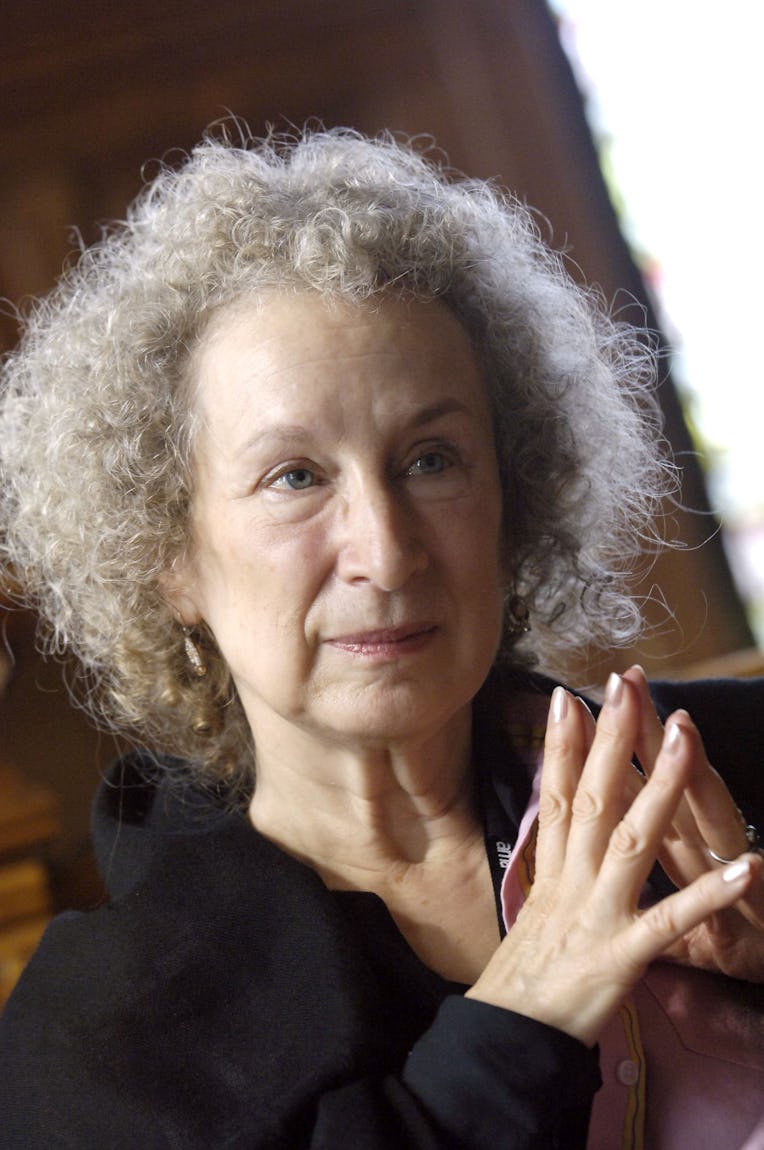Margaret Atwood: Saying “Woman” Is Kind Of My Whole Deal
I'll stop when I'm dead (soon)

It seems Margaret Atwood — the Canadian author whose most famous work centers a dystopian theocracy where the ruling patriarchs’ obsession with fertility yields a rigid social hierarchy that grants some women rights at the expense of others — has weighed in on the phrase “pregnant person.”
Friday morning, the 81-year-old tweeted a link to a Toronto Star op-ed titled, “Why We Can’t Say ‘Woman’ Anymore?” Its author, a columnist named Rosie DiManno, trots out the same wounded argument as many sullen writers before her. Specifically: that the adoption of gender-neutral language constitutes an “erasure of women” and leaves “well-meaning people tongue-tied, lest they be attacked as transphobic or otherwise insensitive to the increasingly complex constructs of gender.” This is annoying, not least for kickstarting another news cycle about a benign semantic shift and thus requiring blogs to recap it. (Someone is holding a gun to my head right now).
To be clear, Atwood was born in 1939, back when the Ontario Hockey Association’s Oshawa Generals had only just won their first Memorial Cup by besting the Edmonton Athletic Club Roamers at Maple Leaf Gardens in Toronto. That is to say, she is quite old and likely had no idea what she was wading into here. On the other hand, Atwood seemed to be a bit more open-minded about the expanding borders of gender as recently as last year. She tweeted a Scientific American article called “When Sex and Gender Collide.”
Perhaps, a year older and wiser, she found rejoicing in Nature’s infinite variety a bit disorienting, and retreated into the latent conservatism claiming women of the Queen’s commonwealth at a rapid clip. Atwood seems aware of this phenomenon; she defended DiManno today as “not a Terf.”
But Atwood is an accomplished writer whose books, though not particularly interesting to me, have racked up an extensive list of awards, both prestigious and Canadian. So it’s surprising that she’d choose to elevate a column that, however you feel about its contents, inarguably reads like shit. Here’s the intro:
“You Make Me Feel Like a Natural Person with a Vagina.”
“Man! I Feel Like a Person who Menstruates”
“Oh, Pretty Person with a Cervix”
Apologies to Aretha Franklin, Shania Twain and Roy Orbison, but this appears to be where we’re heading if language radicals get their way.
As DiManno sees it, “woman” is “in danger of becoming a dirty word … struck from the lexicon of officialdom, eradicated from medical vocabulary and expunged from conversation.” The ellipsis (her inclusion, not ours) previews the style that follows — a stream of consciousness rant filled with David Simon-style coinages like “hell-storm,” “over-woke,” “no-speak,” and “baffleground.” Perhaps it’s not surprising that this spoke to the woman whose own neologisms include words like “birthmobile.”
DiManno scorns what she calls an “infelicitous evolution of language,” the latter of which “is fundamentally about communicating clearly.” But her own “lexicon of officialdom” is so crammed with modifiers, non sequiturs, and idiotic turns of phrase that even Logic’s probably thinking: “Ok, that’s too many words.” Among her funniest rhetorical moves comes in condemning The Lancet, a British medical publication, for titling an article, “Bodies With Vaginas.”
In one fell swoop, “The Lancet” — remember, this is a medical publication! — reduced womanhood, biological or metaphysical, to purely anatomical parts, a gross reversal of the century-long campaign to, not only achieve equal rights, but for women to be seen as more than their biological and rampantly objectified, sexualized packaging.
Fair enough. We would not want to reduce womanhood, biological or metaphysical, to purely anatomical parts. But let’s not annihilate this wordsmith with logic. It would distract from her puns. “The battleground of language has turned into a baffleground of agendas,” DiManno concludes. “I am woman and I am roaring.”